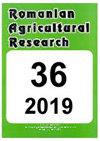接种固氮菌提高玉米花生间作产量的研究
IF 1
4区 农林科学
Q3 AGRONOMY
引用次数: 0
摘要
间作和施用生物肥料在可持续农业生态系统中发挥着重要作用。在伊朗北部的Astaneh-ye Ashrafiyeh进行了为期两年的田间试验,以评价接种固氮杆菌(Azotobacter chroococum)对花生/玉米间作系统生长和产量的影响。试验设计为随机完全区组,有3个重复。影响因素为:对照(未接种)和接种(接种固氮菌),不同玉米(Zea mays L.)/花生(Arachis hypogaea L.)间作模式(100%花生+ 100%玉米、100%花生+ 50%玉米、50%花生+ 100%玉米、50%花生+ 50%玉米、67%花生+ 33%玉米、33%花生+ 67%玉米)。还采用了花生和玉米单作。结果表明,接种花生和玉米的年平均产量和间作模式均比未接种花生和玉米增产10%和16%。固氮菌对籽粒氮素浓度也有显著正影响,对花生籽粒含油浓度无显著影响,显著降低玉米籽粒含油浓度。土地等效比(LER)在1.05 ~ 1.70之间,表明间作对环境资源的利用效率更高。结果还表明,接种间作苗地的LER比未接种苗地高12-16%。100%花生+ 50%玉米间作模式的接种区LER最高(1.70),50%花生+ 50%玉米间作模式的未接种区LER最低(1.05)。根据本试验结果,建议采用100%花生+ 50%玉米并施用固氮菌的间作模式,可获得玉米/花生间作体系的最高产量。本文章由计算机程序翻译,如有差异,请以英文原文为准。
Increasing the Productivity of Intercropping Corn and Peanuts by Inoculation with Azotobacter Chroococcum
Intercropping and bio-fertilizer application play important roles in sustainable agro-ecosystems. A two-year field experiment was conducted at Astaneh-ye Ashrafiyeh, Northern Iran, to evaluate the effect of Azotobacter (Azotobacter chroococcum) inoculation on the growth and yield of a peanut/maize intercropping system. The experimental design was a randomized complete block in a factorial arrangement with three replicates. Factors were Azotobacter application [control (non-inoculated) and inoculation (with Azotobacter chroococcum) and different maize (Zea mays L.)/peanut (Arachis hypogaea L.) intercropping pattern (100% peanut + 100% maize, 100% peanut + 50% maize, 50% peanut + 100% maize, 50% peanut + 50% maize, 67% peanut + 33% maize, and 33% peanut + 67% maize). Sole cropping of peanut and maize were also used. Results showed that averaged across years and intercropping patterns, grain yields of peanut and maize were significantly increased by 10% and 16%, respectively, in inoculated plots compared to non-inoculated ones. Azotobacter also had a positive significant effect on nitrogen concentration of grain, while it had no significant effect on oil concentration of peanut grain and significantly decreased the oil concentration of maize grain. Land equivalent ratio (LER) ranged from 1.05 to 1.70, indicating more efficient and productive use of environmental resources by intercrops. Results also showed that inoculated intercropped plots had 12-16% grater LER that non-inoculated ones. The highest LER was observed for inoculated plot with 100% peanut + 50% maize intercropping pattern (1.70), while the lowest one was recorded for non-inoculated plot with 50% peanut + 50% maize intercropping pattern (1.05). Based on the result of this experiment, intercropping pattern of 100% peanut + 50% maize along with Azotobacter application is recommended to obtain the highest productivity in maize/peanut intercropping system.
求助全文
通过发布文献求助,成功后即可免费获取论文全文。
去求助
来源期刊

Romanian Agricultural Research
农林科学-农艺学
CiteScore
0.90
自引率
28.60%
发文量
2
审稿时长
>12 weeks
期刊介绍:
The Journal ROMANIAN AGRICULTURAL RESEARCH is an “open access” one, which publishes original articles, short communications, presenting new scientific results – theoretical, experimental and technical – on plant breeding and genetics, physiology, biotechnology, mineral nutrition and plant protection, in field crops. Reviews on up-to date subjects and recent research, preferably from Eastern Europe, may also be published.
 求助内容:
求助内容: 应助结果提醒方式:
应助结果提醒方式:


